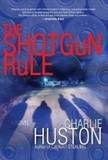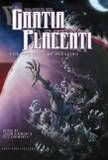The Shotgun Rule / Charlie Huston
 Ballantine Books / August 2007
Ballantine Books / August 2007
Reviewed by: Martel Sardina
The Shotgun Rule is a coming of age story about four friends who are forced to grow up fast when faced with the consequences of making a bad decision. Brothers Andy and George Whelan have spent the summer of 1983 doing what most teenage boys normally do, riding their bikes and hanging out with their friends, Paul and Hector.
When Andy’s bike is stolen by one of the Arroyo brothers, George, Paul and Hector have to help him get it back. While Andy is in the same grade as the other boys, that is due to being skipped ahead twice. He is younger, smaller and weaker than the others and no match for the Arroyo brothers, who range from schoolyard bullies to hardened ex-cons.
After a nasty confrontation, the boys decide that the only way to get Andy’s bike back is to break into the Arroyos’ house and retrieve it. The group isn’t surprised by the discovery of a bicycle chop shop but when they realize that the Arroyos are involved in manufacturing crank, they decide to exact their own revenge. They steal some of the Arroyos stash of drugs and other stolen goods and then make an anonymous call to the police to tip them off about the crank lab. It’s self-preservation, after all; the Arroyos will know who robbed them, and the only way to save themselves is to rat the Arroyos out. It seems like a perfect plan.
Unfortunately, this plan is not perfect. The boys’ decision has repercussions that they could never have imagined. The boys have unleashed bigger villains and unearthed family secrets their parents had fought hard to protect them from. The question now is: is it too late for redemption?
Charlie Huston weaves a hard-hitting tale revealing candid truths about the relationships of fathers and sons, brothers, and friends.
Take for example this passage where George reflects on being a brother:
Fucking Andy!
George rides hard, trying to find his brother.
Sometimes? Sometimes, man, he just wishes he didn’t have a brother at all. How much easier would that make life?
Fifteen years since the little shit was born, and he’s been underfoot every single day of every single year. Always such a baby. Such a crybaby. From the moment Mom came home from the hospital with him he was crying. God! The years of sharing a room with him after he was too old to sleep in mom and dad’s room but before dad put in the attic room, was there anything worse than that? Six years old and the kid was always waking up with nightmares, crying.
Or this passage where Bob (Andy and George’s father) reflects on his family and his life:
Nine days out of ten it’s more fun to butt heads with George than it is to try and figure out what Andy is talking about. Pick him up from school on a rainy day, he’s chattering about some theory of how the universe is all made of empty space, how everything solid is mostly just air. Or not even air. Made of just nothing. Made of the chance that something might be in all the nothing. Or some shit like that. A little kid with stuff like that in his head. Still, it’s better than when he starts in on Dungeons & Dragons. Might as well be speaking in tongues…None of it in the cards. Thirty five. A woman like this. Sons like these.
They’d been taking bets on him fifteen years ago, most people who knew a thing about him would have had theirs on prison or a coffin. And it would’ve been safe money.
Huston’s dialogue is intense, cutting to the quick, and leaves the reader reeling with the characters as the story unfolds. Huston doesn’t have to impress the reader with an exotic locale. Suburban Northern California is rendered beautifully, showcasing the fact that evil lurks in ordinary places. Small town America is not safe from the problems that many believe only exist in big cities.
Huston is the author of the Henry Thompson trilogy as well as the Joe Pitt novels. The Shotgun Rule is his first stand-alone thriller. Stephen King called the novel “Stand By Me on Dexedrine.” Readers will find that Huston has earned his place as one of the most compelling voices in crime fiction today.
Gratia Placenti / Edited by Jason Sizemore and Gil Ainsworth
 Apex Publications / December 2007
Apex Publications / December 2007
Reviewed by: Michele Lee
Gratia Placenti is the 2007 follow-up to Apex Publications' first Stoker-nominated featured writer anthology, Aegri Somnia. Subtitled "For the sake of pleasing" the stories all incorporate the themes of pleasure and punishment.
The anthology starts off with "Translatio" by Geoffrey Girard, a twisted tale of servitude that starts dark and dives, without hesitation, for darker. Keller and his family are witnesses to the ending of the world. At who’s hands or for what purpose this end occurs are never answered, but there is plenty in the how. Despite plagues of madness, devastating birth defects, ominous things that patrol the cities, and a great liquid shadow-wave - a composition of the tortured souls who have died so far - Keller and his family seem immune. The crashing wave of shadow leaves their home unmarked; the bulbous, tentacled creatures above the streets let Keller pass by unharmed. And the secret of this immunity lies in the visions that Keller experiences and puts into writing. Facing a choice between madness and death, Keller tries to find a way to break free. In an innovative twist, Keller blinds himself halfway into the story leaving a climax rendered in four senses only. Oppressively dark and daringly delivered, "Translatio" is likely to leave readers wondering if this anthology might be more than they can handle.
"Follow the Canary" by Athena Workman is the weird tale of Robert, who buys a faceless human-like creature on the black market that somehow can find whatever its master desires. As the story unfolds, we learn that Robert is on a quest, spurred on by his wife whose bodiless head now nags him to find her missing body parts. “Follow the Canary” is like a trek through a strange world, equal parts science fiction, civil war, and modern day. It’s a genre-bending, shudder-inducing addition to the anthology likely to either be loved for its imagination or disliked for the hyper-focus on what could be a very interesting world.
"Crasher" by Debbie Kuhn turns the theme in a new direction. The story opens as Martin, a Vietnam vet haunted by his memories of the war, tries to find the strength to end the miserable pit of depression that his life has become. As he prepares to pull the trigger, he hears what he believes to be an angel's voice sing out from the church across the street. The beauty of it brings peace to his heart, strengthening his shattered soul against the ongoing assault of painful memories. The voice belongs to Elaine, a retired opera singer and a distant symbol of a better life for the battered man. But Elaine’s songs only bring Martin peace for so long, and the nightmare things that haunt him are unwilling to permit him happiness. "Crasher" brings a shot of bitterness to the theme, turning it from dark things done to please others to dark things unwilling to let others be pleased. It’s an interesting variation on the theme.
David Niall Wilson's "Some Glue Never Dries" also uses the haunting of minds to propel the characters forward. Brad is a man struggling with his past, trying to come to terms with haunting, dream-like versions of memories and the knowledge that his father blames him for his mother's death. Trapped between his therapy session where his remembering helps solidify his progress and a mental plain that seems to hold some hope of rewriting the past - even if is all in his mind - Brad teeters on the edge of revelation and relapse into a fantasy dream world. Compelling and engrossing, "Some Glue Never Dries" is likely to be found on many an awards lists next year.
"The Cutting Room" by Shane Jiraiya Cummings easily surpasses its sex and gore façade. In this tale of a bizarre incident in an autopsy room and a corpse who isn't quite done with the living, Cummings shows not only an innate knowledge of what happens after death but also an ability to twist a story around a reader like a deadly trap. Playful and sexually-charged in all the wrong ways, this tale of dead love puts the stories of necrophiliac morticians to shame.
"Bright Red Razors" by Teri Jacobs combines elements of the two previous stories, focusing on Haley, a woman in a therapy session after she cuts her own eye out. Twisted and addicted to razors, Haley battles her therapist, her need for cutting, and her tormentor - the shadowy Black Angel - in a rich tale that takes cutting past emo and into a different realm altogether. Half the enjoyment in this one comes from the surreal beauty of the language, used as tool, to make this a pleasurably dark addition to the anthology.
"Party Makers" by Adrienne Jones is the carnivalesque tale of Hal, a reclusive screenwriter who, on the advice of his brother, hires a company to populate the birthday party he just invited his ex-girlfriend to with actual attendees. The reader is led through a frustrating maze of bizarre events, barely mentioned participants, and selfish, childlike betrayals, as Hal suddenly finds himself in a sick game of keep-away with everything he has at stake. The thematic pleasure in this tale is split - appearing as jealousy from people who feel they deserve what Hal has, in the very nature of the strange party guests Hal finds he has hired, and in the most carnal translation of the word itself. The story seems rushed and not fully developed, with characters that are mere shadows of what they could be and a climax that comes off feeling far too much like the bickering of children.
At first mention of the mean-spirited rednecks and little green aliens in J.A. Konrath’s “Them’s Good Eats”, you think you know where the story is headed; but fans of Konrath know better than to expect something predictable. When Jimmy Bob (a man a little too obsessed with anal probes) brags to friend Earl about torturing his pigs to make the resulting meat a bit sweeter, a silver spaceship shows up out of the blue and the obvious expectations of the story are for a bit of turnabout on the cruel rednecks. But Konrath isn't content to predictably spin the characters’ actions back on themselves here and give the reader the story they anticipate. Likely to make readers feel a little bad for laughing at the stereotypical hicks, this story gives fans a good dose of Konrath's dark humor, perhaps enough to leave them wanting more.
"Something Wet" by James Reilly is one of the first stories in the anthology to take the theme in a direction many would expect - into the realm of sex. Les is an unlikely leading man, a virtual porn star in a virtual sex flick in which the viewer’s head ends up superimposed on Les’ porn star body as they travel through virtual carnality. Approached by the disfigured husband of a former co-star, Les agrees to help him make “a Dark”, a term used here for an video, that will help him restore the intimacy between him and his wife. Only someone has death on their minds. Reilly’s tale keeps the twists coming, climaxing in a bloody, dark mess of reader satisfaction.
Bev Vincent's "Popup Killer" starts with a scene familiar to many a Web surfer. When protagonist Nate gets an annoying popup ad that refuses to go away, he follows the link to Truist.corp, where the enigmatic Al asks him for a name of someone in his life whose removal would make Nate's life better. Scoffing in disbelief, Nate clicks off. But Al’s words linger, and Nate eventually revisits the site and gives up a name. The next day, like dark magic, an annoying co-worker named Ted never existed, and only Nate and Al seem to remember the name at all. Al insists that Nate should give him more names, citing three to five as the average number of names that the people Al helps surrender to him. But Nate’s life is not enriched by the erasing of these bothersome forces in his life, and he soon learns the expansive affects of Al’s strange ability to eliminate lives. “Popup Killer" is instantly familiar to the modern Internet user, and it ventures into a cavernous electronic world rich in raw genre material yet to be fully mined by writers of dark fiction. With “Popup Killer”, Vincent brings a well-written, cautionary tale to the star power of Gratia Placenti’s pages.
"Only Spirits Cry" by R. Thomas Riley is the poignant tale of a boy who wants to save his mother from dying. In this story that’s more fantasy than science fiction, the boy is privy to a strange swamp populated by remnants from Greek mythology. Within the framework of a larger theme that expands on the old adage "You can never go home", Riley writes a tale in which the reader can indeed go home again, where a man can become a boy again and once more venture into the unknown to save the mother he loves. The story moves back and forth between past and present, which some readers may find disconcerting. Fairy tale-like in its mood and atmosphere with mythical creatures that feel authentic and easy to connect with, this addition to the anthology holds the dark and light sides of life in balance, never quite letting either side take charge.
"The Listening" by Neil Ayres is a softer, more tragic story than the previous entries. For protagonist Iain, a trip to Ireland brings back memories of his wife, Sara, who disappeared while six months pregnant with their first child. Whether Sara’s disappearance was of her own doing or at the hands of a malevolent force is unclear. While Iain eventually finds solace with Sara's friend Gem and a life of relative happiness, Sara's disappearance nags at him like an unresolved betrayal. The gentlest story of the bunch, "The Listening" successfully captures the feeling of gradually fading memories, where even the bad times are softened by an eventual, reluctant happiness over the course of time.
Concluding the anthology is Mary Robinette Kowal's futuristic "Tomorrow and Tomorrow", the tale of Tuyet, a cleaning woman working on a space station hoping to earn enough money to buy her ailing son a new set of lungs. A tale of the desperate things people do for the sake of others, this story presents a sympathetic character who is sucked into a murder plot after the fact, and is too deeply involved by the time she realizes it to change the outcome. With more than just her own life at stake, Tuyet is tragically doomed by either path she takes.
The Gratia Placenti anthology is yet another fine example of the quality behind the Apex name. Like its predecessor, it's likely to be well-regarded as a fine addition to the genres the stories within are both inspired by and an homage to.
Purchase Gratia Placenti, edited by Jason Sizemore and Gil Ainsworth.
Disposal / Jeff Strand
 Biting Dog Press / November 2007
Biting Dog Press / November 2007
Reviewed by: Blu Gilliand
Based on the sheer number of forwards that stack the front of Disposal, Jeff Strand’s new novella from Biting Dog Press, the author has a lot of friends in the business. Based on the content of those forwards, he’s made a lot of enemies. Either that, or he’s surrounded himself with people who share the same dark, caustic sense of humor that suffuses his work.
I’m betting on the latter. Until Disposal, I’d never seen a book with ten forwards; after reading them all, I’m sure I’ve never enjoyed any single forward a much as I did this group. Respected writers such as Brian Keene, James A. Moore, and Christopher Golden take great delight in dragging Jeff Strand’s good name and considerable talent through the mud, all with tongues planted firmly in cheeks. It’s an absolutely genius way to set the tone for the story that follows.
Disposal centers around Frank, a gleefully arrogant petty thief who targets places like comic shops and delis because they typically don’t have security cameras. One night, as he’s holding up a 24-hour laundromat, the clerk asks him two questions: One, has Frank ever killed anyone? And two, would he mind very much coming by her place and killing her husband? Frank readily agrees, after getting the woman to agree to a particularly salacious payoff, only to find upon arriving at her home that the job has already been done.
If this sounds like a straight-up crime drama with a dash of whodunit thrown in for good measure, keep reading. Because once the corpse starts breathing again, this simple story – not to mention Frank’s night – gets turned completely upside-down.
There’s a lot of humor in Disposal, but make no mistake – it is of the pitch-black variety. Still, Frank is such a convincing character – arrogant, cocksure, the kind of guy you hate and admire at the same time – that the absurdity of the events never yank the reader out of the story.
There are a few places, particularly toward the end, where the book teeters perilously close to going too far over the top, but Strand’s strong characterization of Frank usually manages to rein things in. The book clocks in at around a hundred pages (including several black-and-white illustrations by cover artist Keith Minnion, and, of course, those hysterical forwards), and is a lean, fast read. If you haven’t read Strand before, or would like to see him at the top of his game, give Disposal a shot.
Purchase Jeff Strand's Disposal.
Heartsick / Chelsea Cain
 St. Martin’s Minotaur / September 2007
St. Martin’s Minotaur / September 2007
Reviewed by Martel Sardina
Is Hannibal Lector scary? He might have been once, but there’s a new psychopath in town. Chelsea Cain’s female counterpart, Gretchen Lowell, has put the thrill back into a sub-genre that many feared had gone stale.
In Heartsick, Detective Archie Sheridan is called back to active duty to catch a killer who is preying upon Portland’s teenage girls. Sheridan has the experience to do the job, having spent ten years tracking Gretchen Lowell, “The Beauty Killer,” but that experience was gained at a cost most would be unwilling to pay. Sheridan survived being kidnapped and tortured by Lowell but is now in a different kind of prison. He’s addicted to painkillers, lost his family, and can’t get Gretchen Lowell out of his head. He continues to visit Lowell in prison in the hope that she will lead him to the bodies of victims who have not yet been found.
Sheridan’s return to the force is a newsworthy item. Susan Ward, a young, idealistic reporter is assigned to profile Sheridan and cover the murder investigation. Thus begins a deadly game between Archie, Susan, and the new killer. Like Silence of the Lambs, Cain finds a way to make Gretchen Lowell relevant to the new case.
Cain’s characters are vibrant, exciting and easy to care about. Once the key players are introduced, Cain immerses us in their world, and never gives us the opportunity or the desire to leave them. Take for example, this exchange between Gretchen, Archie and Susan:
“She likes you,” Gretchen said teasingly to Archie.
Archie pulled a brass pillbox out of his pocket and set it on the table in front of him. “She’s a reporter,” he said, rotating the small box in a clockwise motion on the tabletop. “She’s friendly with her subjects so they tell her things. It’s her job.”
“Do you tell her things?”
“Yes,” he said, looking at the box.
“But not everything.”
He glanced up at Gretchen meaningfully. “Of course not.”
Gretchen seemed satisfied by this, and she settled her attention on Susan. “What are your questions?”
Susan was startled. “My questions?”
Gretchen gestured to the digital recorder. She wore the manacles like they were bracelets, lovely and expensive baubles to be admired and envied. “That’s why you’ve come here, right? With your little gadget and furrowed brow? To interview me? You can’t write a story about Archie Sheridan without talking to me. I made him who he is today. Without me, he wouldn’t have had a career.”
“I’d like to think I would have found some other megalomaniacal homicidal psychopath,” Archie said with a sigh.
Gretchen ignored him. “Go ahead,” she said to Susan. “Ask me anything.”
The prose is beautifully crafted. Cain makes every sentence, every word count. She reveals as little as possible along the way, leaving the reader hungry for more. Will Archie find the killer or will this investigation push him over the edge?
It was agonizing to have to stop reading this book. The ending is left open to the possibility of a sequel. With any luck, the wait for Cain's next roller coaster ride will be a short one.
Purchase Chelsea Cain's Heartsick.
The Shallow End of the Pool / Adam-Troy Castro
 Creeping Hemlock Press / March 2008
Creeping Hemlock Press / March 2008
Reviewed by: Blu Gilliand
Most genre fiction is escapist by nature, providing opportunities to face fear head-on in the form of vampires, werewolves, zombies, and other easy-to-dismiss-‘cause-they-don’t-exist staples. But every once in a while, an author is haunted by things that are so strongly grounded in the real world that dressing them up in Halloween costumes fails to do the subject justice.
With The Shallow End of the Pool, his new novella from Creeping Hemlock Press, Adam-Troy Castro shows us just such a horror. It is the horror of failed love, broken relationships, and the burdens people place on the ones they supposedly love.
In most reviews, this would be the perfect place to provide a neat, tidy synopsis of the book’s plot. However, it is this reviewer’s opinion that the best way for readers to come into this story is with absolutely no idea of where things are headed. Castro’s storytelling is so tight that readers have just enough time to form two or three possible scenarios before he hits you full in the face with what’s about to happen. And just as soon as you process where the story is going, you’re smack-dab in the middle of an event too horrifying to comprehend – as are the characters themselves.
So no, I don’t want to spell out the plot. What I do want is to make sure it’s understood just how potent Castro’s work is. His vivid prose will bruise you, bloody you, and burn you like a hot Vegas day. Castro, whose body of work covers an amazing variety of subjects (everything from guides to The Amazing Race television series to Spider-Man novels, science fiction, fantasy and horror), has honed this piece so that every word wounds you, while at the same time compelling you to come back for more.
If you don’t mind putting aside the made-up madmen and monsters that entertain us (and yes, often, even scare us) for a lingering look into the face of true madness and despair, pick up The Shallow End of the Pool.
Purchase Adam-Troy Castro's The Shallow End of the Pool.
Morbid Curiosity / Deborah LeBlanc
 Leisure / July 2007
Leisure / July 2007
Reviewed by: Derek Clendening
Dark magic, with all its promises and consequences, is still a useful device in horror literature. Deborah LeBlanc’s Morbid Curiosity treats this plot like few others in horror and saves a well-worn concept from cliché by creating memorable characters and plot twists aplenty. Leblanc isn’t afraid to go for the throat in this tale of two sisters.
LeBlanc sets her tale in the small town South, a locale which offers a genuine sense of place and mood. Haley’s life is changed by a promise from the most popular girl in school, but this girl isn’t popular because of her beauty or charm. She’s popular because of a dark magic ritual, and she’s willing it to teach Haley. It seems too good to be true. If Haley can convince her twin sister to partake in the dark rituals, the power will double. What Haley doesn’t consider are the consequences that come with such a godsend – that these powers are deadly if they’re left unfed.
LeBlanc proves her resourcefulness by adding satisfying twists to this recycled plot. The promise/consequence concept as fright-bait is commonplace, but needing to literally feed these powers through the flesh is new. Haley must feed these powers through a tattoo called her ‘sigil’, which expands on the dark magic sub-genre and spins the novel into its own category. LeBlanc is also unafraid to tackle sensitive subjects, such as adolescent death. The closest genre comparison that comes to mind is Stephen King’s Carrie.
The mechanics of LeBlanc’s dialogue are most impressive, and her ability to step up from conventional cardboard conversation is what offers the novel such a convincing and authentic sense of place. The prose itself isn’t quite as gripping as the dialogue. While her writing is clean and concise, it lacks the punch and original voice of many of her contemporaries. It’s a modest shortcoming given her ability to write a novel that is not easily categorized. The same can be said about her previous novels such as A House Divided and Grave Intent. Morbid Curiosity is a novel with enough nuances to stand alone.
Purchase Deborah LeBlanc’s Morbid Curiosity.
Monkey Love / John Paul Allen
 Biting Dog Press / December 2007
Biting Dog Press / December 2007
Reviewed by: Jeff Burk
Biting Dog Press concludes its successful three-novella series, which included Kealan Patrick Burke’s Midlisters and Jeff Strand’s Disposal, with Monkey Love by up-and-coming dark scribe John Paul Allen. When Professor Sandra Rixx’s husband, Richard, dies in a terrorist bombing, her life falls apart. She travels to Uganda to throw herself into her work studying gorillas. One gorilla in particular catches Sandra's attention, one that has a familiar marking on its fur that bears a remarkable likeness to her dead husband's tattoo. This inspires her to concoct a plan to bring the love of her life back.
Sandra's story makes for a gripping and disturbing tale. Allen cruelly toys with a character whose sense of purpose has been shattered. As Sandra begins to find meaning in life again, various forces converge to unwittingly send her down into unfathomable darkness. Her downward spiral is sure to shock, and what Allen has in store for her made this reviewer gasp aloud on more than one occasion.
As a bonus, the book includes the short story "House Guest", an equally disturbing psychological drama about a couple whose daughter is brain-dead and being cared for at home. Unbeknownst to them, their daughter's boyfriend is living in her closet and has a few ideas on how to make the family happy again.
Both stories explore a very dark world in which individuals attempt to find love through whatever means necessary. Allen places the reader forefront in the characters’ heads in unnervingly clear fashion. While readers can see the terrible fates about to befall the characters, they are able to empathize and understand the desires (as twisted as they may be) that blind the stars of Allen's tragedies. Reader be warned: the book contains very graphic scenes of sexual horror. To Allen’s credit, these scenes come across less exploitative than filled with a genuine sense of emotional torment.
John Paul Allen has not yet received widespread attention in the horror community; if Monkey Love is any indication, then that is certain to change. His prose is lean and tight, and each of his characters is written with a distinctive voice. At his best, Allen possesses the rare ability to combine genuine emotional drama and graphic horror. Readers are likely to be smitten with Monkey Love, and will undoubtedly seek to turn this one-night stand with the talented Allen into a long-term relationship.
Purchase John Paul Allen’s Monkey Love.




